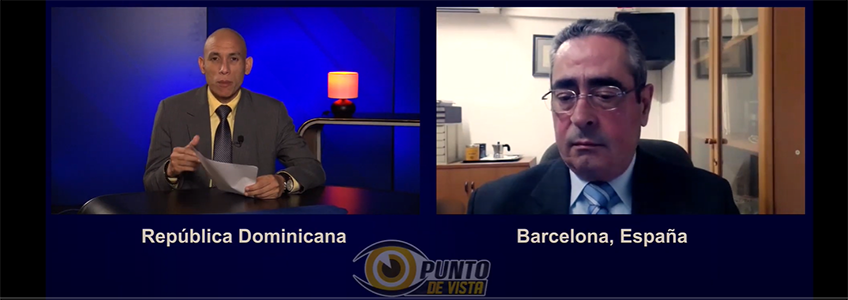Dr. Luis Jimenez, director of the Master in Criminal Psychology and of the Master in Criminalistics promoted by the Iberoamerican University Foundation (FUNIBER), is interviewed by Mr. Jer Yan Lantigua, host of the program Punto de Vista, broadcast on channel 10 of Telenord, Dominican Republic.
Through a video call, Dr. Luis Jimenez has been a special guest of the program Punto de Vista to discuss issues related to crime, focusing on factors that could influence individuals to become criminals both in Latin American countries as well as the current situation in Europe.
Dr. Jimenez has clarified that there is no infallible formula that turns individuals into criminals, rather there are factors that can influence decision-making, which can lead to delinquency. It is a fact that sex, age, neurological, psychopathological, genetic, social, cultural, etc., factors may have an influence, but these are not causal determinants of criminal behavior.
During the interview, Mr. Jer Yan Lantigua asked if there are mechanisms through criminal psychology to prevent delinquency, to which Dr. Jimenez answered with a categorical no. This is because humans as individuals are not influenced by the same factors. They also discussed the current situations in the Dominican Republic and Spain, as well as the criminal containment work being carried out in El Salvador and the growing insecurity that has entered countries such as Norway, Sweden, and Finland.
Dr. Jimenez assured that education at home and in institutes, schools, and colleges is a way to address the problem of delinquency at an early stage, stressing that today children and young people have access to all kinds of content through the media and through the Internet, in the contemporary scenario.
In saying goodbye, he also invited those interested in learning more to take the Master in Criminal Psychology through the programs promoted by FUNIBER at the Universidad Europea del Atlántico (European University of the Atlantic, UNEATLANTICO), the Universidad Internacional Iberoamericana de México (International Iberoamerican University of Mexico, UNINI Mexico), and for Dominicans to continue their professional training through the Universidad de La Romana (University of La Romana, UNIROMANA).
